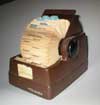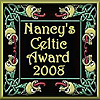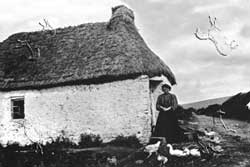| |

Traditions, folklore, history and more. If it's Irish, it's here. Or will be!
"People will not look forward to posterity who never look backward to their ancestors."
-Edmund Burke




Quotes
Library: Books, Movies, Music
Prints & Photos
Poetry
Jokes


Shops Ireland
Bunús na Gaeilge
(Basic Irish)
Circle of Prayer
Blessings
Did You Know?
Himself/Herself
Write to Us
Readers Write..
Links/Link to Us
Advertise with us
Awards & Testimonials
Submissions Guide


|
|
|
Brigid of the Songs
by Pádraic H. Pearse
Brigid of the Songs was the most famous singer in Rossnageeragh, not only in my time but in my father's time. It's said that she could wile the song-thrush from the branch with the sweetness of the music that God gave her; and I would believe it, for it's often she wiled me and other lads besides from our dinner or our supper. I'd be a rich man to-day if I had a shilling for every time I stopped outside her door, on my way home from school, listening to her share of songs; and my father told me that it's often and often he did the same thing when he was a lad going to school.
It was a tradition among the people that it was from Raftery himself that Brigid learned Conntae Mhuigheó (The County of Mayo), and isn't it with the Conntae Mhuigheó that she drew the big tears out of the eyes of John MacHale one time he was on a visit here, along with our own Bishop, a year exactly before I was born?
A thing that's no wonder, when we heard that there was to be a Feis in Moykeeran, we all settled in our minds that it's Brigid would have the prize for the singing, if she'd enter for it. There was no other person, neither men-singers nor women-singers, half as good as she was in the seven parishes. She couldn't be beaten, if right was to be done. She would put wonderment on the people of Moykeeran and on the grand folk would be in it out of Galway and out of Tuam. She would earn name and fame for Rossnageeragh. She would win the prize easy, and she would be sent to Dublin to sing a song at the Oireachtas. There was a sort of hesitation on Brigid at first. She was too old, she said. Her voice wasn't as good as it used be. She hadn't her wind. A share of her songs were going out of her memory. She didn't want a prize. Didn't the men of Ireland know that she was the best singer in Connacht? Didn't Raftery praise her, didn't Colm Wallace make a song in her honour, didn't she draw tears out of the eyes of John MacHale? Brigid said that much and seven times more; but it was plain, at the same time, that there was a wish on her to go to the Feis, and we all knew that she would go. To make a short story of it, we were at her until we took a promise out of her that she would go.
She went. It's well I remember the day of the Feis. The world of Ireland was there, you'd think. The house was overflowing with poor people and with rich people, with noble folk and with lowly folk, with strong, active youths, and with withered, done old people. There were priests and friars there from every art. There were doctors and lawyers there from Tuam and from Galway and from Uachtar Ard. There were newspaper people there from Dublin. There was a lord's son there from England. The full of people went up, singing songs. Brigid went up. We were at the back of the house, listening to her. She began. There was a little bashfulness on her at the start, and her voice was too low. But she came to herself in time, according as she was stirring out into the song, and she took tears out of the eyes of the gathering with the last verse. There was great cheering when she had finished, and she coming down. We put a shout out of us you'd think would crack the roof of the house. A young girl went up. Her voice was a long way better than Brigid's, but, we thought, there was not the same sadness nor sweetness in the song as there was in Brigid's. She came down. The people cheered again, but I didn't notice that anybody was crying. One of the judges got up. He praised Brigid greatly. He praised the young girl greatly, too. He was very tedious.
'Who won the prize?' says one of us at last, when our share of patience was exhausted.
'Oh, the prize!' says he. 'Well, in regard to the prize, we are giving it to Nora Cassidy (the young girl), but we are considering the award of a special prize to Brígid ní Mhainí (our Brigid). Nora Cassidy will be sent to Dublin to sing a song at the Oireachtas.'
The Moykeeran people applauded, for it was out of Moykeeran that Nora Cassidy was. We didn't say anything. We looked over at Brigid. Her face was grey-white, and she trembling in every limb.
'What did you say, sir, please?' says she in a strange voice.`Is it I that have the prize?'
'We are considering the award of a special prize to you, my good woman, as you shaped so excellently - you did that - but it's to Nora Cassidy that the Feis prize is given.'
Brigid didn't speak a word; but it's how she rose up, and without looking either to the right hand or to the left, she went out the door. She took the road to Rossnageeragh, and she was before us when we reached the village late in the night.
The Oireachtas was to be in Dublin the week after. We were a sad crowd, remembering that Brigid of the Songs wouldn't be there. We were full sure that fair play wasn't done her in Moykeeran, and we thought that if she'd go to Dublin she'd get satisfaction. But alas! we had no money to send her there, and if we had itself we knew that she wouldn't take it from us. We were arguing the question one evening at the gable of the Boatman's house, when who should come up but little Martin Connolly, at a full run, and he said to us that Brigid of the Songs was gone, the lock on the door, and no tale or tidings to be got of her.
We didn't know what happened her until a fortnight's time after that. Here's how it fell out. When she heard that the Oireachtas was to be in Dublin on such a day, she said to herself that she would be there if she lived. She didn't let on to anyone, but went off with herself in the night-time, walking. She had only a florin piece in her pocket. She didn't know where Dublin was, nor how far it was away. She followed her nose, it's like, asking the road of the people she met, tramping always, until she'd left behind her Cashlagh, and Spiddal, and Galway, and Oranmore, and Athenry, and Kilconnell, and Ballinasloe, and Athlone, and Mullingar, and Maynooth, until at last she saw from her the houses of Dublin. It's like that her share of money was spent long before that, and nobody will ever know how the creature lived on that long, lonesome journey. But one evening when the Oireachtas was in full swing in the big hall in Dublin, a country-woman was seen coming in the door, her feet cut and bleeding with the hard stones of the road, her share of clothes speckled with dust and dirt, and she weary, worn-out and exhausted.
She sat down. People were singing in the old style. Brígid ní Mhainí from Rossnageeragh was called on (for we had entered her name in hopes that we'd be able to send her). The old woman rose, went up, and started Conntae Mhuigheó.
When she finished the house was in one ree-raw with shouts, it was that fine. She was told to sing another song. She began on the Sail Og Ruadh (The Red Willow). She had only the first line of the second verse said when there came some wandering in her head. She stopped and she began again. The wandering came on her a second time, then a trembling, and she fell in a faint on the stage. She was carried out of the hall. A doctor came to examine her.
'She is dying from the hunger and the hardship,' says he.
While that was going on, great shouts were heard inside the hall. One of the judges came out in a hurry.
'You have won the first prize!' says he. 'You did' -. He stopped suddenly.
A priest was on his knees bending over Brigid. He raised his hand and he gave the absolution.
'She has won a greater reward than the first prize,' says he.
Editorial Notes: The son of an Irish mother and an English father, Pádraic Pearse was born in Dublin and educated at the Christian Brothers' School. He became a writer of poems, storys and plays in both English and Gaelic. To learn more about his life and to read a few of his poems, please click Padraic Pearse.
Resources:
Text: http://www.ucc.ie/celt/published/E950004-030/
Brigid of the Songs in Plays, Stories, Poems, published by Talbot Press,
Dublin
Image: Irish housewife from Barewalls.
To see more black and white photos of Ireland long ago, please click our Photographs & Prints.
|
|
Fri, Sep 27, 2024
 The Galway Hooker The Galway Hooker
This unique vessel, with its distinctive curved lines and bright red sails, originated in the village of Claddagh. During the 19th century, hookers supported a significant fishing industry and also carried goods, livestock and fuel. Seán Rainey is remembered for building the last of the original boats, the Truelight, for Martin Oliver who was to become the last king of the Claddagh; as king, he was entitled to white sails on his boat. Since the mid seventies, many of the old sailing craft which were on the verge of extinction have been lovingly restored and new ones have been built. During the summer months they can be seen at festivals such a Cruinniú na mBád - the Gathering of the Boats - in Kinvara.
Click for More Culture Corner.
Pádraic Pearse, who played a prominent part in the 1916 rebellion, declared Ireland a Republic from the steps of the General Post Office in Dublin. He was executed, along with the other leaders, for his part in the Rising. But he was a gentle warrior at heart. These five stories show us that Pearse was a man of deep understanding with immense human awareness of the way of life of the average person. He analyses the sorrows and joys of the Irish people of his time, and writes of the tragedies of life and death from which they could never escape.
Review from Mercier Press
Click for Stories of P. Pearse.
|
|
|
|
|




 The Galway Hooker
The Galway Hooker